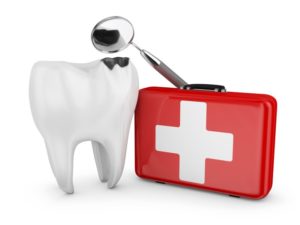
You brush your teeth with fluoridated toothpaste twice every day. You floss to clean every millimeter of your teeth. You rinse with an antibacterial mouthwash for good measure. But still, every time you visit your dentist, you always seem to have cavities. At the same time, your friend who isn’t nearly as diligent about their oral hygiene always gets off scot-free. What’s going on?
As it turns out, some people are just naturally more prone to getting cavities than others. Here are five reasons why – and what your dentist can do to help!
#1. Diet
When looking to cut down on tooth decay, the first step should be taking a look at what you eat and drink. Unless you clean your teeth immediately after eating, sugars remain on and between your teeth and along your gumline. Bacteria in your mouth then have ample time to feast on these sugars and leave behind a destructive waste product that erodes tooth enamel – thus causing cavities.
To reduce your number of sugar-induced cavities, it’s a good idea to limit your consumption of sodas, juices, sweets, and carbohydrates like white breads. Replace these items with crunchy fruits and veggies and wash down your meals with water to rinse any leftover food particles out of your mouth.
#2. Oral Bacteria
The bacteria of some people’s natural oral biome are more aggressive than others when sugars are introduced into the mouth. This means they naturally create more acid that breaks down the tooth enamel. To combat this, add rinsing with an antibacterial mouth rinse to your normal brushing and flossing routine.
#3. Dry Mouth
Dry mouth can occur for many reasons, and is a side effect of many medications. Whatever the case may be, a dry mouth is actually at an increased risk of developing cavities. This is because saliva helps fight off harmful bacteria by washing away excess debris from your teeth. To protect your oral health, sip plenty of water throughout the day and consult with your dentist or doctor for other ways to combat dry mouth.
#4. Receding Gums
If your gums pull back from your teeth, it gives bacteria easier access to the vulnerable roots of your teeth. Plus, gum recession can be a sign of gum disease, which often weakens the cavity-busting immune system by causing chronic inflammation. Schedule an appointment with your dentist so they can closely examine your gums, and in the meantime, brush near your gumline gently with a soft-bristled toothbrush. An enamel-enhancing mouthwash can also help keep bacteria away from your exposed dental roots.
#5. Tooth Shape
Some teeth have naturally deeper grooves than others. Food particles are then more likely to get caught in the rough surface texture. To make matters worse, these types of teeth are often harder to effectively clean, and the grooves are closer to the root of the tooth, meaning that any cavity that develops is likely to have more destructive results. In this case, it’s definitely worth investing in a powerful mouthwash to make sure you clean every nook and cranny of your smile.
How Your Dentist Can Help
When it comes to teeth that are predisposed to cavities, it’s vital to pinpoint the root cause of the problem. As you can see, there are many different ways to protect weakened teeth, and you’ll need professional help to find the best solution for your smile. That’s where your dentist comes in! Not only can they help you diagnose the issue, but they’ll also guide your treatment plan and give you personalized tips. With their assistance, you can effectively prevent cavities.
About the Practice
Dr. Krunal Patel and Dr. Poorvi Gandhi are known for providing compassionate, judgement-free dental care to patients in Ambler and other nearby areas. With decades of experience between the two of them, you can trust this dynamic duo to get to the bottom of your frequent cavities and create an effective, personalized prevention plan for your smile. To schedule your appointment today, call their office at 215-643-5220.



